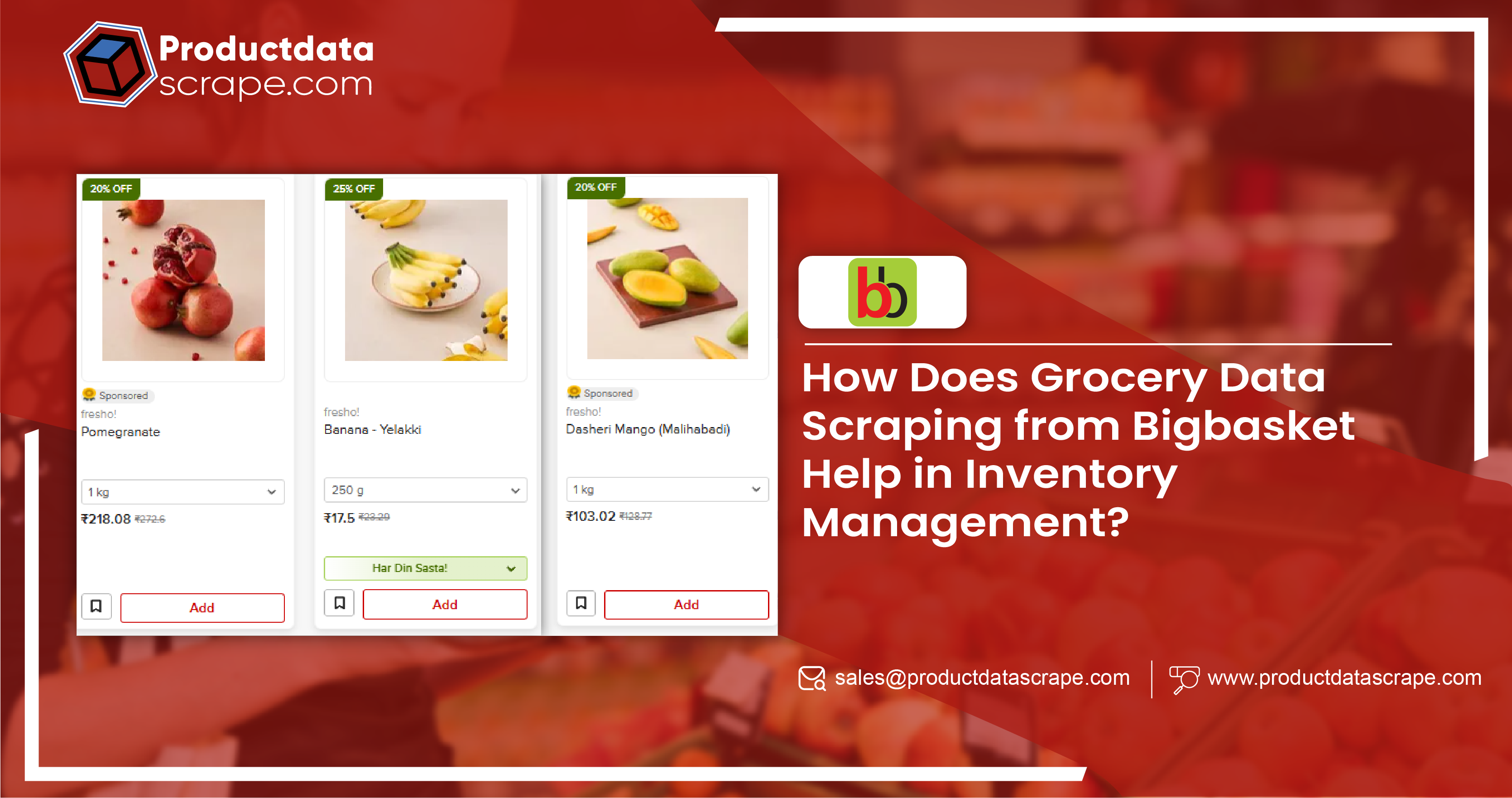
The growth of online grocery shopping has revolutionized how consumers buy everyday essentials. Bigbasket has become one of India's leading platforms, offering an extensive range of products, competitive pricing, and an easy-to-use interface. With such a vast inventory, it can be challenging for businesses, market analysts, and developers to keep track of BigBasket's ever-changing prices, product details, and stock availability. Grocery Data Scraping from Bigbasket solves this challenge by extracting valuable, real-time information from the platform. This process helps businesses monitor product listings, pricing trends, stock levels, and competitor strategies. With accurate and up-to-date data, companies can make informed pricing, inventory management, and marketing decisions. Leveraging BigBasket data scraping services allows businesses to gain a competitive edge, track consumer preferences, and stay ahead of market trends, ensuring they can meet the demands of the fast-evolving online grocery market.
Understanding Grocery Data Scraping
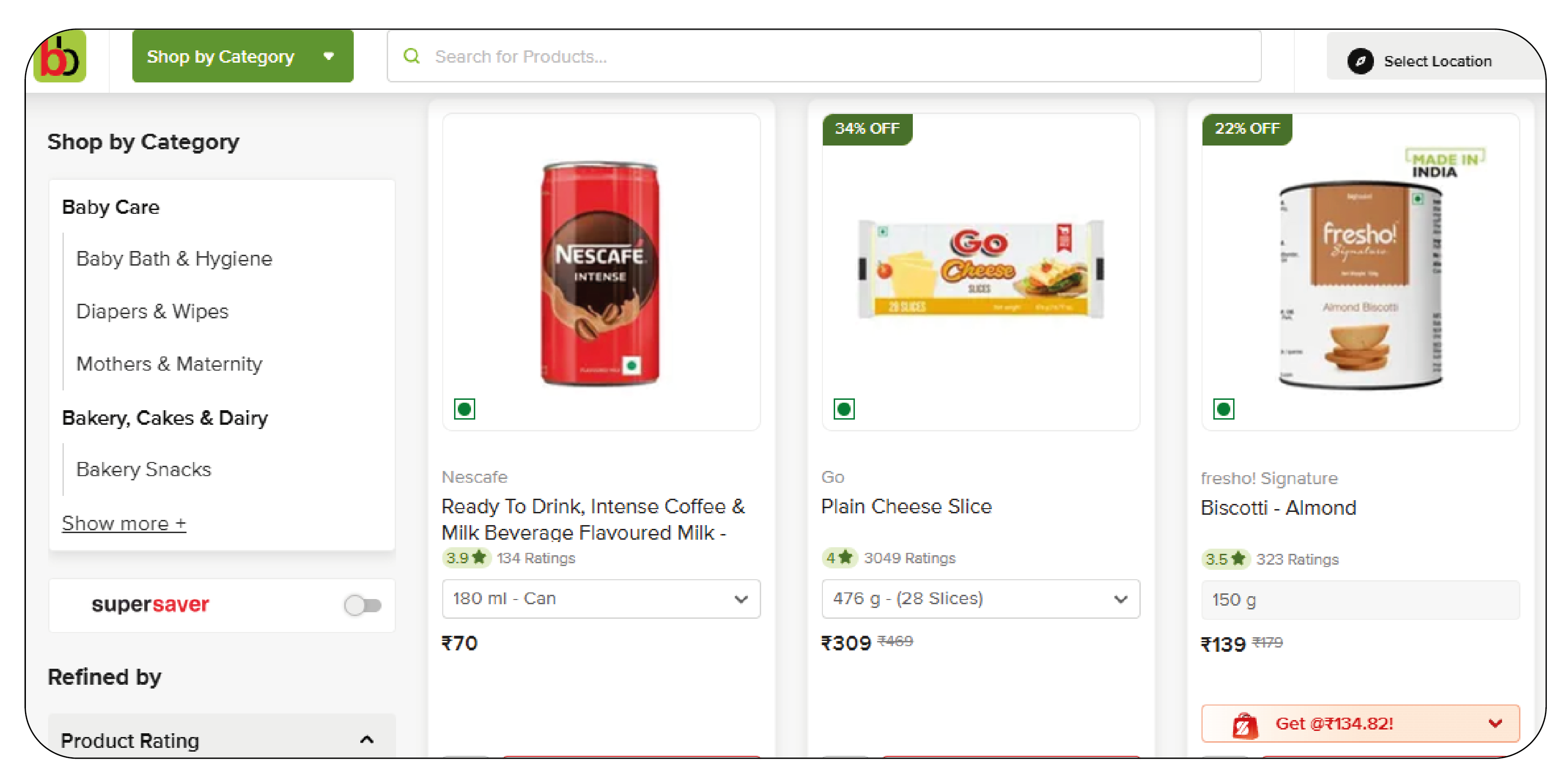
Grocery data scraping extracts valuable and structured data from online grocery platforms like Bigbasket. It involves gathering information like product names, categories, descriptions, prices, stock availability, ratings, reviews, and more. Real-time BigBasket data scraping offers businesses and analysts the advantage of monitoring up-to-date data from Bigbasket's platform, which can help them track trends, identify consumer behavior, and assess pricing strategies. With this real-time data, companies can optimize pricing models, improve inventory management, and develop targeted marketing campaigns. BigBasket online grocery scraper tools can also automate this process, saving time and resources. By leveraging this data, businesses can make data-driven decisions, stay competitive, and better understand the dynamics of the online grocery market. As consumer preferences evolve rapidly, real-time data scraping ensures businesses remain agile and responsive to market changes, giving them an edge over competitors.
Why Bigbasket Data Scraping Matters?
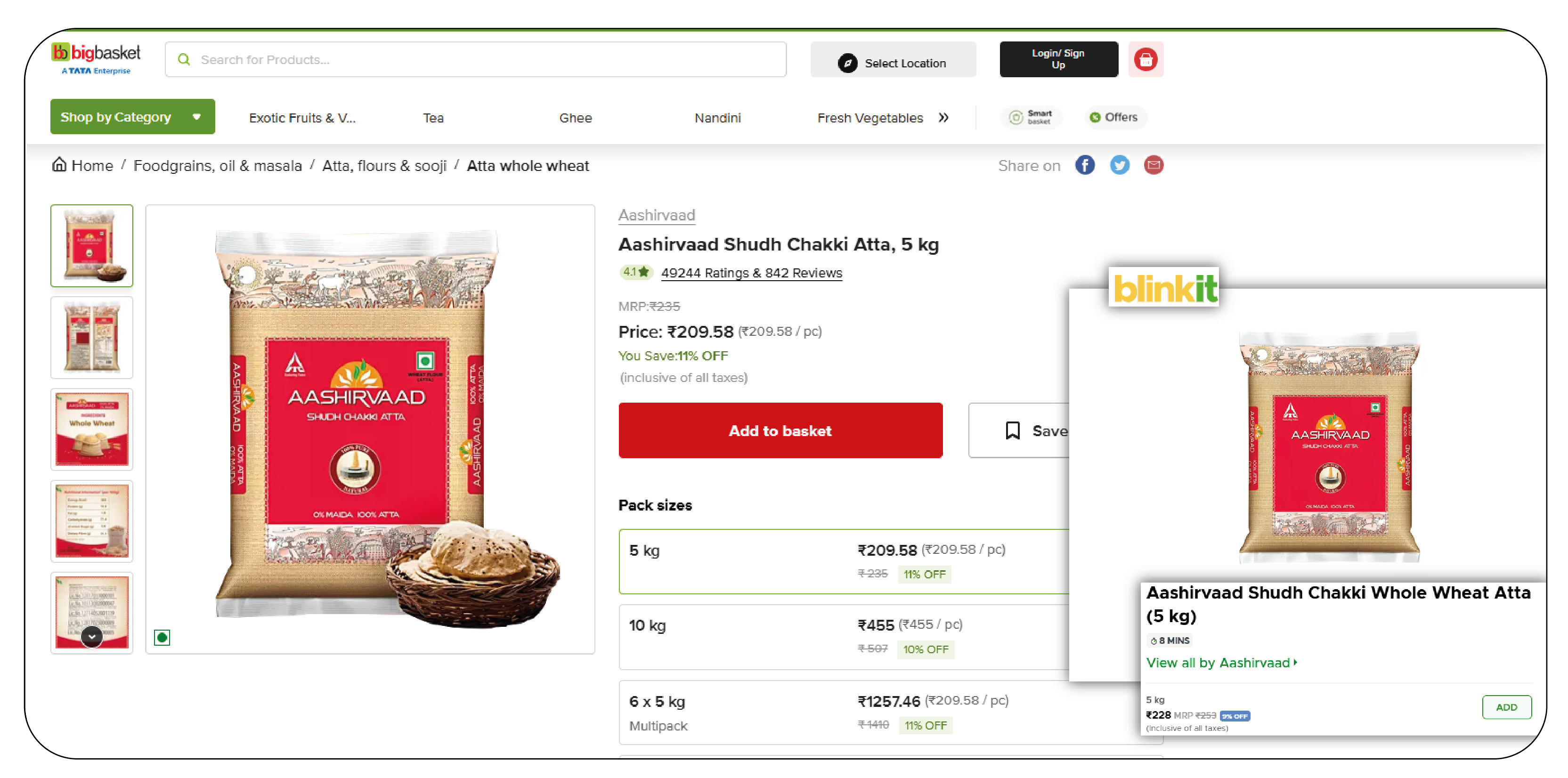
Bigbasket's enormous product catalog spans various categories, such as fruits and vegetables, dairy products, pantry staples, snacks, beverages, and personal care items. This marketplace's dynamic nature, where promotions and product availability change frequently, makes scraping Bigbasket's data a valuable tool for anyone looking to stay ahead in the grocery industry.
Here are some reasons why scraping Bigbasket data is essential:
- Market Analysis and Competitive Intelligence: By scraping Bigbasket's data, businesses can monitor competitors, track market trends, and analyze customer sentiment. For instance, analyzing price variations on similar products across platforms can help businesses adjust their pricing strategies. Using tools to extract BigBasket grocery data enables a deeper understanding of how competitors position their products.
- Product Research and Pricing Optimization: Scraping data on product prices, availability, and discounts helps retailers monitor their competitors' offerings. This insight into pricing patterns allows businesses to make data-driven decisions on how to price their products, ensuring they remain competitive. Leveraging BigBasket grocery data collection provides comprehensive datasets for effective pricing optimization.
- Inventory and Stock Management: Scraping Bigbasket's data allows businesses to track stock levels of various products. This is particularly useful for managing inventory, ensuring products are always in stock, and optimizing supply chains. With BigBasket Grocery Dataset, businesses can automate the monitoring of stock levels to prevent shortages.
- Consumer Sentiment Analysis: Gathering product ratings, reviews, and feedback provides valuable information on consumer preferences. Businesses can use this data to understand customer satisfaction, product performance, and areas for improvement. By Web Scraping BigBasket Data, businesses can capture a wide range of consumer sentiments in real-time.
- Trend Monitoring: Scraping BigBasket's data enables businesses to stay on top of emerging trends. By observing changes in product listings, discounts, and customer behavior, businesses can identify trending products, allowing them to effectively cater to consumer demand. Accessing BigBasket Quick Commerce Datasets allows businesses to make fast and informed decisions based on real-time data insights.
Key Data Points in Bigbasket Data Scraping
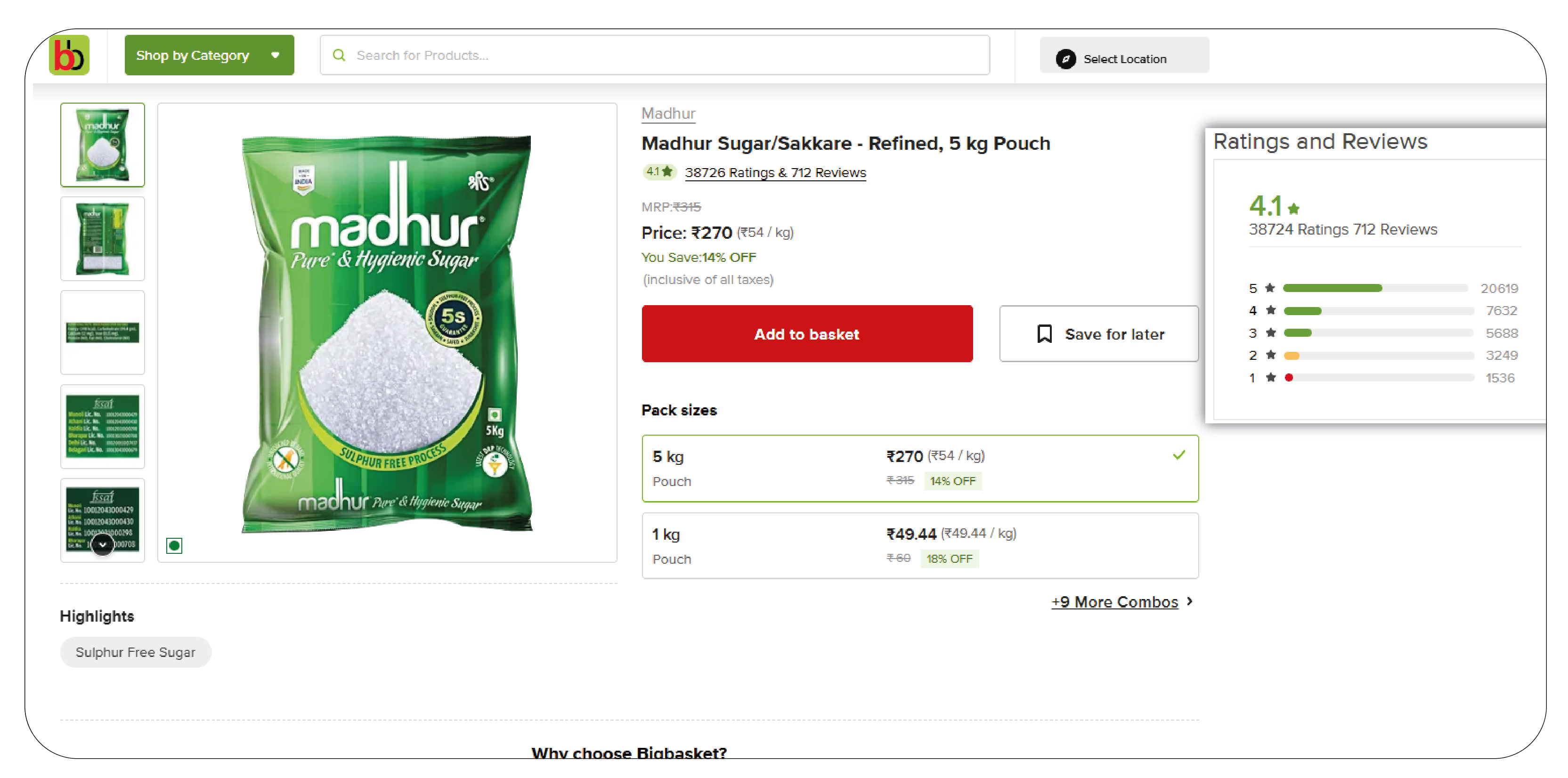
When scraping data from Bigbasket, several important data points are typically extracted. These data points provide valuable insights into Bigbasket's product offerings and consumer behavior:
1. Product Details: It includes the product name, description, and specifications. Extracting detailed product information helps businesses understand what's available and what competitors are offering.
2. Prices and Discounts: Real-time price data is crucial for monitoring pricing strategies and understanding market trends. This includes information on product discounts, offers, and pricing changes.
3. Stock Availability: Data on product availability helps businesses understand which products are in demand and which are out of stock. This can guide inventory management and supply chain optimization.
4. Product Categories: Categorizing products into different sections, such as fruits, vegetables, dairy, snacks, etc., allows businesses to assess which categories are growing in popularity.
5. Ratings and Reviews: Product reviews and ratings provide deep insights into consumer preferences and opinions. This data helps businesses identify customer pain points, potential product improvements, and areas where their competitors excel.
6. Delivery Options: Many consumers are interested in delivery options, such as delivery time, shipping charges, and free delivery thresholds. Scraping this data can help businesses understand customer priorities regarding convenience.
7. Brand Information: Information on brands and product manufacturers helps businesses identify popular brands and assess competition. It can also help retailers adjust their brand partnerships and product offerings.
Challenges in Scraping Grocery Data from Bigbasket
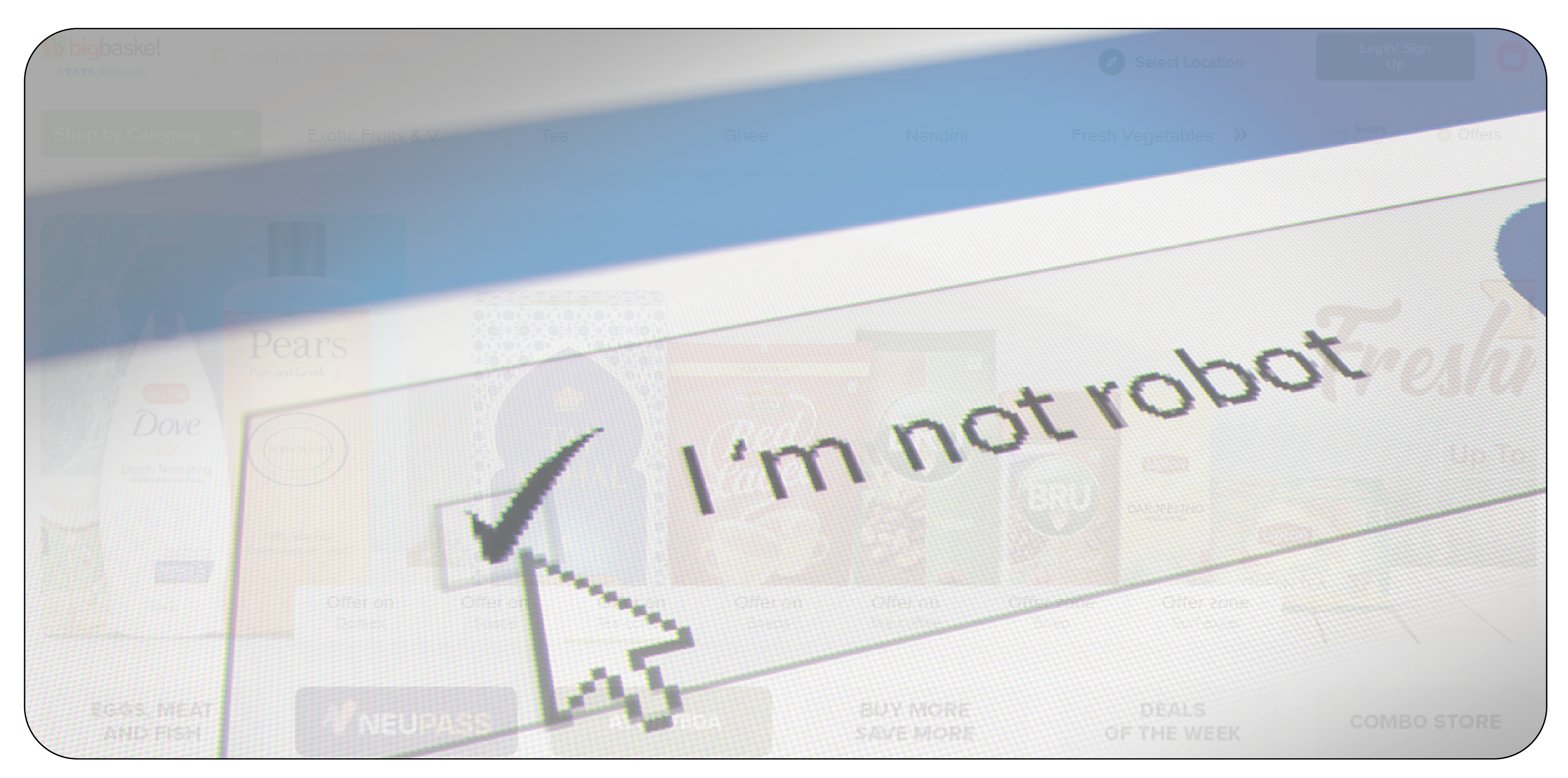
While scraping grocery data from Bigbasket offers numerous advantages, there are several challenges that businesses and data analysts must overcome:
1. Frequent Website Changes: Bigbasket regularly updates its website, including product listings, pricing, and promotions. These changes can affect scraping scripts, leading to errors in data extraction. It's essential to constantly monitor and adjust scraping tools to ensure accurate data collection.
2. Anti-Scraping Mechanisms: Like many online platforms, Bigbasket may have anti-scraping measures in place to prevent unauthorized data extraction. These measures can include CAPTCHAs, rate-limiting, IP blocking, and other techniques to detect and block scrapers. To overcome these, sophisticated scraping tools with proxy rotation and CAPTCHA-solving capabilities are required.
3. Data Quality and Consistency: Ensuring the accuracy and consistency of scraped data can be difficult, especially when dealing with incomplete or inconsistent product information on the website. Manual data cleaning and validation may be necessary to maintain high-quality datasets.
4. Legal and Ethical Concerns: Scraping data from any website involves legal and ethical considerations. While scraping publicly available information is generally permissible, businesses must respect Bigbasket's terms of service and ensure they are not violating copyright or intellectual property rights. It is also essential to avoid overloading the website's servers using responsible scraping techniques.
5. Data Structuring and Formatting: Extracted data from Bigbasket may not always be in a structured format, making it challenging to analyze. Proper data structuring, such as converting unorganized data into tables or databases, is essential for efficient analysis.
Technologies Used in Grocery Data Scraping from Bigbasket
To scrape grocery data from Bigbasket, several technologies and tools can be employed:
1. Web Scraping Frameworks: Popular web scraping frameworks like Scrapy, BeautifulSoup, and Selenium are commonly used for extracting data from websites. These tools allow users to parse HTML data, extract specific elements like product names, prices, and availability, and store the data in structured formats.
2. APIs: Some websites offer access to structured data. If Bigbasket provides an API for its product catalog, it would be more efficient and reliable than web scraping. APIs also help reduce the chances of violating a website's terms of service.
3. Proxy Rotation and IP Management: Given that Bigbasket may employ anti-scraping measures, proxy rotation tools like ScraperAPIor RotatingProxies are often necessary to prevent IP blocking. These services rotate IPs, ensuring that scraping attempts don't appear suspicious.
4. Data Storage Solutions: After scraping, the data needs to be stored efficiently for analysis. Relational databases like MySQL, PostgreSQL, or NoSQL databases like MongoDB are commonly used. Cloud storage solutions like Amazon S3 can also store large datasets.
5. Data Cleaning and Analysis Tools: Pandas and NumPyin Python are often used to clean and manipulate scraped data. Additionally, data visualization tools like Tableau or Power BI can help analyze and present the data effectively.
Legal and Ethical Considerations in Scraping Bigbasket Data
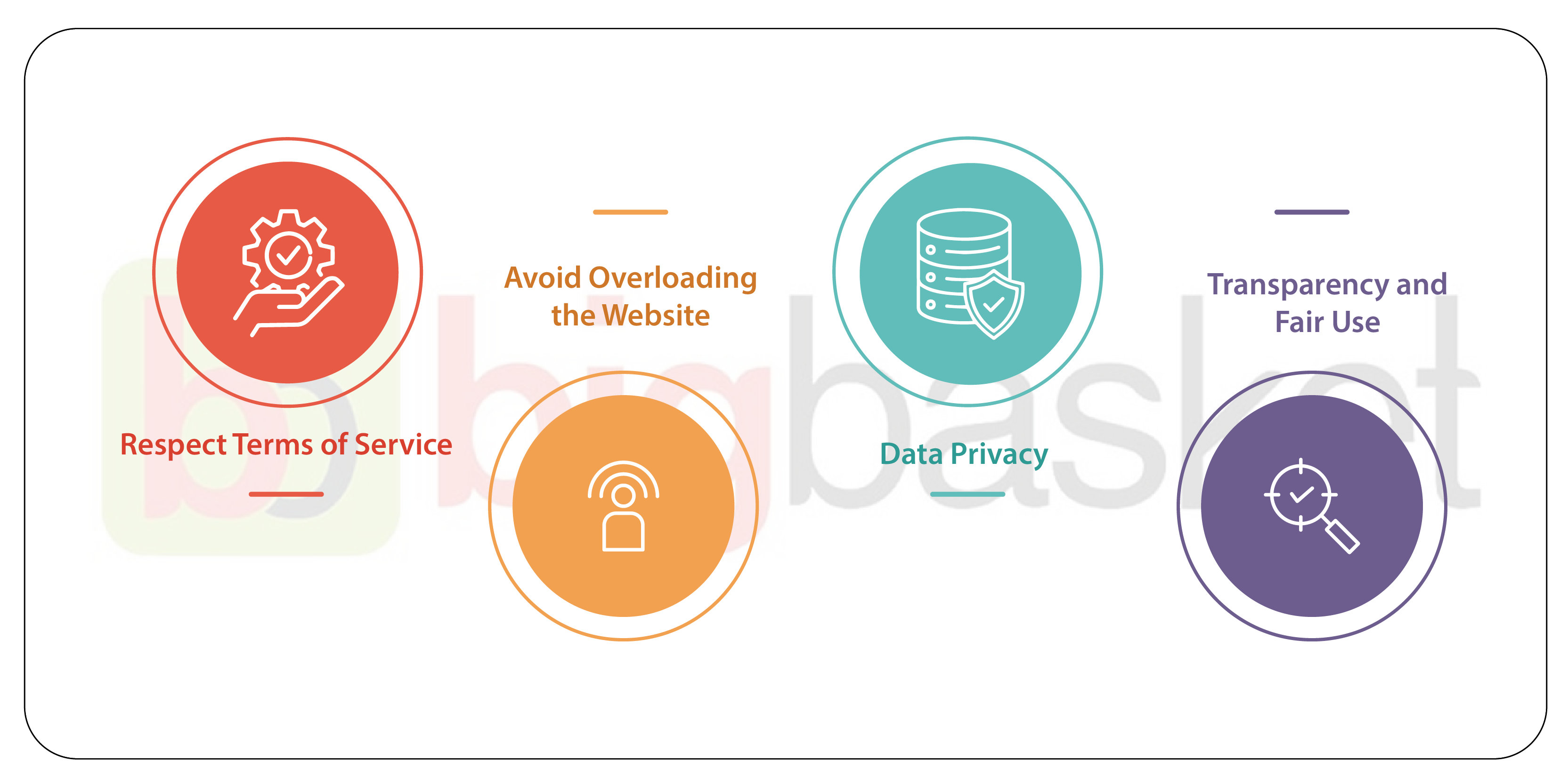
When scraping BigBasket's data, businesses need to adhere to specific legal and ethical guidelines:
1. Respect Terms of Service: Bigbasket's website likely has service terms restricting automated scraping. Reviewing these terms and determining whether scraping is allowed or if permission must be obtained is essential.
2. Avoid Overloading the Website: Scrapers must be designed to avoid overloading Bigbasket's servers causing potential disruptions in service for users. Rate limiting, scraping at off-peak hours, and minimizing requests per minute can help mitigate this issue.
3. Data Privacy: When scraping customer-related data (if permissible), it's essential to comply with data privacy laws such as the GDPR(General Data Protection Regulation) in the EU and CCPA(California Consumer Privacy Act) in California.
4. Transparency and Fair Use: Scraped data should be used ethically, ensuring it's not used for unfair competition or to mislead consumers. Businesses should be transparent about how they collect and use the data.
Conclusion
Grocery data scraping from Bigbasket offers significant advantages for businesses seeking insights into the online grocery market. By extracting real-time data, businesses can optimize pricing, track competitors, manage inventory, and improve customer engagement. This capability is handy for price monitoring, allowing businesses to stay updated on fluctuations in product prices across different platforms. Furthermore, scraping Bigbasket's data helps businesses refine their Pricing Strategy by identifying trends, assessing competitors' price points, and adjusting accordingly to maintain a competitive edge. However, navigating the challenges associated with web scraping is crucial, including technical, legal, and ethical considerations. By leveraging the right technologies and best practices, businesses can use Bigbasket data to stay competitive and make informed decisions in the rapidly evolving online grocery landscape.
At Product Data Scrape, we strongly emphasize ethical practices across all our services, including Competitor Price Monitoring and Mobile App Data Scraping. Our commitment to transparency and integrity is at the heart of everything we do. With a global presence and a focus on personalized solutions, we aim to exceed client expectations and drive success in data analytics. Our dedication to ethical principles ensures that our operations are both responsible and effective.





































.webp)






